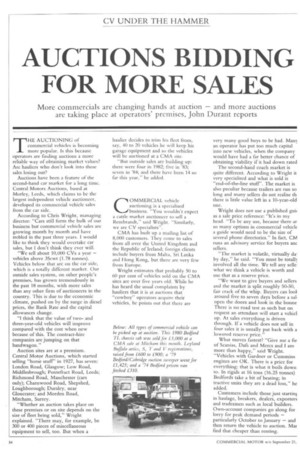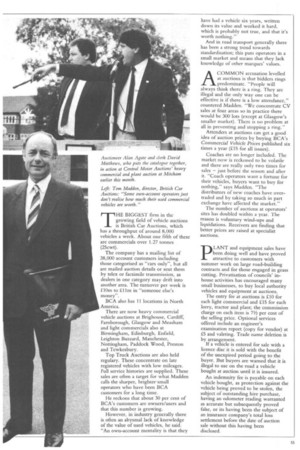AUCTIONS BIDDING FOR MORE SALES
Page 56

Page 57

If you've noticed an error in this article please click here to report it so we can fix it.
More commercials are changing hands at auction — and more auctions are taking place at operators' premises, John Durant reports
THE AUCTIONING of commercial vehicles is becoming
more popular. Is this because operators are finding auctions a more reliable way of obtaining market values? Arc hauliers who don't look into these sales losing out?
Auctions have been a feature of the second-hand car market for a long time. Central Motors Auctions, based at Morley, Leeds, which claims to be the largest independent vehicle auctioneer, developed its commercial vehicle sales from the car side.
According to Chris Wright, managing director: "Cars still form the bulk of our business but commercial vehicle sales are growing month by month and have trebled in the past three years. I would like to think they would overtake car sales, but I don't think they ever will.
"We sell about 10,000 CVs a year — vehicles above 35cwt (1.78 tonnes). Vehicles below that are on the car side, which is a totally different market. Our outside sales system, on other people's premises, has grown tremendously in the past 18 months, with more sales than any other firm of auctioneers in the country. This is due to the economic climate, pushed on by the surge in diesel prices, the Bank Rate and the capital allowances change.
"I think that the value of twoand three-year-old vehicles will improve compared with the cost when new because of this. The contract-hire companies are jumping on that bandwagon."
Auction sites are at a premium. Central Motor Auctions, which started selling "horse stuff' in 1927, has seven: London Road, Glasgow; Low Road, Middlesbrough; Pontefract Road, Leeds; Richmond Road, Manchester (cars only); Chamwood Road, Shepshed, Loughborough; Dursley, near Gloucester; and Morden Road, Mitcham, Surrey.
"Whether an auction takes place on these premises or on site depends on the size of fleet being sold," Wright explained. "There may, for example, be 300 or 400 pieces of miscellaneous equipment to sell, too. But when a haulier decides to trim his fleet from, say, 40 to 20 vehicles he will keep his garage equipment and so the vehicles will be auctioned at a CMA site.
"But outside sales are building up: there were four in 1982; five in '83; seven in '84; and there have been 14 so far this year," he added.
COMMERCIAL vehicle auctioning is a specialised business. "You wouldn't expect a cattle market auctioneer to sell a Rembrandt," said Wright. "Similarly, we are CV specialists".
CMA has built up a mailing list of 8,000 customers. They come to sales from all over the United Kingdom and the Republic of Ireland; foreign clients include buyers from Malta, Sri Lanka and Hong Kong, but there are very few from Europe.
Wright estimates that probably 50 to 60 per cent of vehicles sold on the CMA sites arc over five years old. While he has heard the usual complaints by hauliers that it is at auctions that cowboy" operators acquire their vehicles, he points out that there are very many good buys to be had. Man) an operator has put too much capital into new vehicles, when the company would have had a far better chance of obtaining viability if it had down rated The second-hand coach market is quite different. According to Wright it very specialised and what is sold is "end-of-the-line stuff'. The market is also peculiar because trailers are run so long and many sellers do not realise th there is little value left in a 10-year-old one.
Wright does not use a published guic as a sale price reference: "It's in my head. "To be any use, because there -ar so many options in commercial vehicle a guide would need to be the size of several phone directories." In fact, CM runs an advisory service for buyers anc sellers.
"The market is volatile, virtually cla: by day," he said. "You must be total') involved all the time. We tell any selle: what we think a vehicle is worth and use that as a reserve price.
"We want to give buyers and sellers and the market is split roughly 50-50, fair crack of the whip. Buyers can lool around five to seven days before a sal. open the doors and look in the bonne There is no road test as such but on request an attendant will start a vehicl up. At sales everything is driven through. If a vehicle does not sell in four sales it is usually put back with a lowered reserve price."
What moves fastest? "Give me a fie of Scanias, Dafs and Mercs and I am more than happy," said Wright. "Vehicles with Gardner or Cummins engines are OK. There is a price for everything: that is what it boils down to. In rigids at 16 tons (16.25 tonnes) Bedfords take a bit of beating; in tractive units they are a dead loss," he added.
Customers include those just startirq in haulage, breakers, dealers, exporters and tradesmen such as local builders. Own-account companies go along for lorry for peak demand periods — particularly October to January — and then return the vehicle to auction. Mar find that cheaper than renting.
THE BIGGEST firm in the growing field of vehicle auctions is British Car Auctions, which has a throughput of around 8,000 vehicles a week. About one fifth of these are commercials over 1.27 tonnes (25cwt).
The company has a mailing list of 38,000 account customers including those categorised as "cars only", but all are mailed auction details or sent them by telex or facsimile transmission, as dealers in one category may drift into another area. The turnover per week is £10m to £11m in "someone else's money".
BCA also has 11 locations in North America.
There are now heavy commercial vehicle auctions at Brighouse, Cardiff, Farnborough, Glasgow and Measham and light commercials also at Birmingham, Edinburgh, Enfield, Leighton Buzzard, Manchester, Nottingham, Paddock Wood, Preston and Tewkesbury.
Top Truck Auctions are also held regulary. These concentrate on late registered vehicles with low mileages. Full service histories are supplied. These sales are often a target for what Madden calls the sharper, brighter small operators who have been BCA customers for a long time.
He reckons that about 30 per cent of BCA's customers arc owners/users and that this number is growing.
However, in industry generally there is often an abysmal lack of knowledge of the value of used vehicles, he said. "An own-account mentality is that they have had a vehicle six years, written down its value and worked it hard, which is probably not true, and that it's worth nothing."
And in road transport generally there has been a strong trend towards standardisation; this puts operators in a small market and means that they lack knowledge of other marques' values.
ACOMMON accusation levelled at auctions is that bidders rings predominate. "People will always think there is a ring. They are illegal and the only way one can be effective is if there is a low attendance," countered Madden. "We concentrate CV sales at four areas so in practice there would be 300 lots (except at Glasgow's smaller market). There is no problem at all in preventing and stopping a ring."
Attenders at auctions can get a good idea of auction prices by buying BCA's Commercial Vehicle Prices published six times a year (£15 for all issues).
Coaches are no longer included. The market now is reckoned to be volatile and there are really only two times for sales — just before the season and after it. "Coach operators want a fortune for their vehicles, buyers want to buy for nothing," says Madden. "The distributors of new coaches have overtraded and by taking so much in part exchange have affected the market."
The number of auctions at operators' sites has doubled within a year. The reason is voluntary wind-ups and liquidations. Receivers are finding that better prices are raised at specialist auctions.
pLANT and equipment sales have been doing well and have proved attractive to customers with summer work on large road-building contracts and for those engaged in grass cutting. Privatisation of councils' inhouse activities has encouraged many small businesses, to buy local authority vehicles and equipment at auctions.
The entry fee at auctions is £10 for each light commercial and £15 for each lorry, tractor and plant; the commission charge on each item is 71/2 per cent of the selling price. Optional services offered include an engineer's examination report (copy for vendor) at £5 and valeting. Trade name deletion is by arrangement. If a vehicle is entered for sale with a licence disc it is sold with the benefit of the unexpired period going to the buyer. But buyers are warned that it is illegal to use on the road a vehicle bought at auction until it is insured.
An indemnity fee is payable on each vehicle bought, as protection against the vehicle being proved to be stolen, the subject of outstanding hire purchase, having an odometer reading warranted as accurate but subsequently proved false, or its having been the subject of an insurance company's total loss settlement before the date of auction sale without this having been disclosed.




































































































